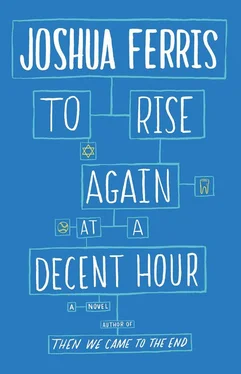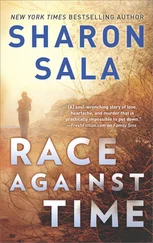“But I do come.”
“You won’t kiss me.”
“I can’t kiss you because I don’t understand you,” she said.
“It’s simple,” he said. “God is a relic you don’t need.”
“You say that. What does it mean?”
“Why do you need God when you have Judaism? Why mar something so beautiful?”
“There would be no Judaism without Him!”
“Do you know the true meaning of the blowing of the shofar?” he asked her.
She hated his arcane questions.
“Of course,” she said. “It announces the start of holidays, and… it awakens the soul—”
“No,” he said. “You are in Los Angeles in the twentieth century. Blowing the shofar in Los Angeles in the twentieth century has the same meaning as blowing the shofar in Gezer and Dibon in the First Temple period. That’s the true meaning of the shofar: to connect the Jews of Los Angeles to the Jews of Gezer whenever it is blown. It is about the people, not God.”
“No,” she said. “That’s not correct.”
“Why did you keep going back to him?” Stuart asked her in the commons room.
“I don’t know,” she said, “I was compelled to, I was drawn to him. I was still in love. He’d lied to me, or misled me, if you want to be kind, and I wanted answers. I was a little scared of him, but I liked listening to him, listening to him thrilled me. And now that he was free to be honest, he had a lot more to say. I was young; I was naïve. I was shocked by most of the things he said, and I was made to think. Was it necessary that the person I loved believe? Why? Because I believed? Did I believe? What did I believe? Or was it enough that he be a Jew? Was he a Jew? He was different, I’ll tell you that. And determined. And he wanted me. I was seduced. I was very sheltered, and I discovered I liked people who acted freely. Why did I go back to him?” she said. “Because he knew how to make me.”
She still worked in the office of her uncle’s grocery. One day her father entered the office, and the two cousins who worked alongside her stood up from their desks in silence and left the room. Then her uncle stood and left, too. Her father sat down on a chair halfway across the room. He looked at her a long time. When he spoke, it was only loud enough to convey the words across the distance.
“You hear from his own mouth that he doesn’t believe, and still you see him?” He paused, and the room was silent. “He comes to our house, he disrupts our peace, he makes a spectacle of us, he menaces us like we live in the ghetto a hundred years ago, and still you choose to disgrace yourself and your family?”
“It’s not that easy, Papa.”
“You give yourself to a man before you’re married.”
“No, Papa, we never—”
“You give yourself to this profane man who’s not your husband,” he said, “and still you see him when you know who he is and what he believes? Tell me who he is, this man, if not Satan dressed up as a Jew?”
“He’s confused, Papa. And I think he’s lost.”
“He’s a fraud, Mirav. And you should have the sense to see it.” He stood. “You will make your choice,” he said. “The fraud, or your family.” And with that he left the room. A few minutes later everyone was back to typing.
His third and final visit took place on a Friday night after services, just before the Shabbat meal. The Mendelsohn family was sitting down when Grant Arthur’s voice entered the house. “ I want to be included,” he cried. “ I want to be God’s chosen. I want to break bread with the Mendelsohns. Welcome me into your home, Rabbi. Give me your traditions, I will carry them forward. Give me your riches, I will safeguard them all my days. You Jews!” he cried. “How lucky God has made you! With your wives and your daughters and your fathers and sons! How blessed you are with life!” Rabbi Mendelsohn was calling the police while the others looked out the window at the figure on the lawn. Mirav saw that he had brought the Chagall. “Let me buy the challah! Let me join the minyan! Let me read from the scroll! Let me in! Will you keep me out because of an accident of birth? When so many others have used that same excuse to oppress and murder you? It was an accident of birth! It was not my fault! I love the Jews!” He continued to implore them until the police arrived. He held up the Chagall and said, “I bought this for you, Rabbi Mendelsohn,” and then he leaned it carefully against a tree. “I believe I saw you admiring it.” The cops stepped out and cuffed him. He had violated the protective order he had been served two days earlier.
Mirav Mendelsohn lived with Grant Arthur in the house on the corner during the five months of his probation. She ran the errands and bought the groceries. She furnished the house with the necessary things. On Fridays they went to services, for which he had special dispensation from the judge, at a synagogue in the Valley, and then they came home, blessed each other, and celebrated the Sabbath with a meal, after which they sang traditional songs out of the siddur.
But it was never easy, Mirav told us in the commons room, and it was doomed from the start.
By logic, persuasion, and force of character, he made her question her belief in God. With argument, appeals to common sense, and intellectual bullying, he showed her how brittle her faith was. With evidence drawn from history, he revealed her faith’s foolishness. Let us go atrocity by atrocity, he said to her. A critical mass of God’s absence accumulated. Bit by bit, he reversed almost twenty years of received wisdom.
Without God, she had even less reason to go home. When you wake, you don’t return to dreams and superstitions. You begin your adjustment, not without bitterness, to uncompromising truth, and bitterness turns to contempt.
“I treated them terribly,” Mirav said of her family thirty years later. “And I suppose they didn’t treat me all that well, either. But the way they treated me was customary, it was to be expected. That doesn’t excuse it, but it explains it. There was no earthly way to explain how I treated them.”
Her secularizing, when it came, was swift and brutal. It was only a matter of time before she took her education in skepticism to its logical conclusion, and started wondering why she should persist in wearing the clothes she had been made to wear since time immemorial, why she should cover her hair or attend services or bless the candles or sing the songs. These struck her suddenly as among a thousand empty gestures of increasing absurdity. He had only himself to blame as, one by one, she stopped doing the things that connected her to her past, finding in them no purpose and no reward. That hadn’t been a part of his agenda. She might refuse to dress appropriately or declare that she wouldn’t be joining him at synagogue or plan nothing to eat for the Sabbath meal, and he would say to her, “Why are you doing this to us?”
“What am I doing? I’m doing nothing.”
“But you have obligations.”
“To whom?”
“To me,” he said. “To the others.”
“What others? What others do you see around here?”
“You’re a Jew!” he cried. “You have obligations to the Jews!”
“What makes me a Jew?” she asked.
“You were born a Jew!”
“And now I’ve grown up,” she said. “So tell me, please: what makes me a Jew?”
It wasn’t a rhetorical question. If he’d come to Judaism as an atheist to seek fellowship among the Jews and found the rituals and customs he needed to order and enrich his desolate young life, she came to atheism to find nothing where once there had been everything, vertigo where there had once been structure, and freedom where there had once been rule. She knew why she was a Jew narrowly defined: she was born of a Jewish mother. But without God, what did Judaism have to do with her life?
Читать дальше












